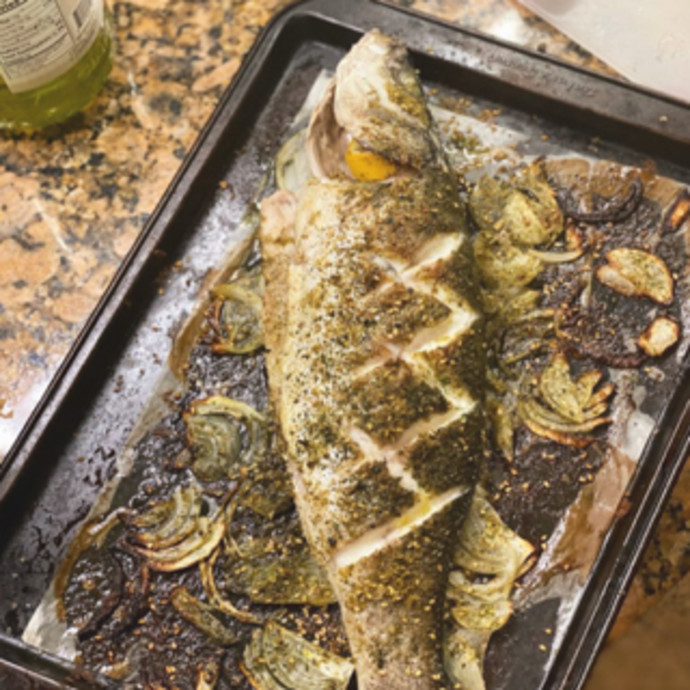Tucked away in the hills of Israel’s Upper Galilee, work is underway on a 16,000 square foot building – formerly the dining hall of a kibbutz – turning it into the primary facility for Jewish National Fund-USA’s Galilee Culinary Institute (GCI by JNF), set to open its doors in 2023. For a culinary institute, GCI by JNF has lofty goals: to change the landscape of what a culinary education looks like, while simultaneously reinvigorating this region of the country.
“We’re not trying to be different for the sake of being different,” said Lior Lev Sercarz, Chief Culinary Officer and Co-Founder of GCI by JNF. “There are amazing institutes around the world that are doing fantastic jobs teaching their respective areas of expertise. But we are interested in changing the way people learn.”
Sercarz, the owner of New York’s La Boîte spices and biscuit shop, is a well-known chef and award-winning cookbook author. Having grown up in the greater Kiryat Shmona region in Israel’s far north, he says that he always dreamed of returning to the region to do something in the food industry but could never find the right partner. That is, until he met Jewish National Fund-USA CEO Russell F. Robinson. Through its One Billion Dollar Roadmap for the Next Decade, the philanthropic movement has been developing new communities in the Negev and Galilee to create affordable and desirable places for Israelis to live outside of the country’s major cities. The population of Kiryat Shmona has dwindled significantly over the past several decades, and the absence of infrastructure – including housing and local access to medical care – has been an obstacle in its renaissance… until now. According to Robinson, building Israel’s foremost culinary institute in this region makes sense, thanks to the superior quality of the land and the views that have earned it the nickname, “the Tuscany of Israel.”

As plans for GCI by JNF began to take shape, Robinson and Sercarz tapped Nathan Hoffman, a Maryland native who had relocated to Tzfat (Safed) in 2017, to join the Institute’s team as CEO, thanks to his history of leading successful start-ups.
“Jewish National Fund-USA is ahead of the rest when it comes to visionaries,” he said. “We have already started to see food tech and ag tech (agriculture technology) companies moving up north and have started to see the government investing a lot of money in this region,” he said. “I started to see the writing on the wall - that our organization wasn’t doing this blindly. They knew that the north was going to be the food technology basket of Israel.”
A New Kind of Education
As opposed to most culinary programs, which are two to four years, GCI by JNF’s program is a 12-month-culinary intensive experience, which reimagines what a culinary education looks like by tailoring the experience to each student’s interests and goals. “We approached the curriculum from the student’s perspective, considering what is going to help them the most, and that’s how we made all of our decisions,” said Hoffman.
Sercarz elaborated that the intention of the program is to avoid having people graduate from a culinary program, only to find that they hate working in a restaurant. “Our goal is to identify with them what their careers should look like – maybe their goal is to become a farmer or an amazing knife maker,” he said. “We want to open their eyes and minds within the culinary world.”
To that end, the curriculum also includes learning about aspects of the food industry that are vital but rarely covered in traditional culinary programs, including accounting, financial and legal aspects, communications, and utilizing photography and videos for social media.
“Whatever exercises we do come from our three pillars of storytelling, entrepreneurship, and activism,” explained Sercarz. “So, whether it’s a class about marketing or a class about making a Caesar salad, we want to know – what’s the story? What’s the financial or entrepreneurial aspect, and what is the activism part, meaning whether the salad is sustainably grown, whether we compost the leftovers, whether we know the farmers that we work with. This is where we’re setting ourselves apart – giving everything meaning – in addition to the fact that the program is not your traditional culinary program.”
Applications for GCI by JNF’s inaugural class next year are already coming in from countries around the world, including Vietnam, Brazil, Egypt, Canada, and the US (in addition to Israel), with applicants ranging in age from 20 to 70 years old. Places in the first two cohorts will be limited so it is expected that the application process will be highly competitive.

A Tourist Destination
One of Jewish National Fund-USA’s Ambassadors who’s especially excited about the positive impact the Institute will have on the local economy and tourism is Sheryl Buchholtz, Co-Chair of the organization’s Go North East Task Force, and Chair of GCI by JNF. “Tourism will be a major component of our Institute’s offering,” said Buchholtz. “Our campus will have full-time students enrolled in the Rosenfield Culinary Arts program in addition to other culinarians who visit for a day, a week or more to fine-tune their crafts that can include cooking, food styling, writing or perfecting recipes and other culinary endeavors.”
Regarding how the Institute fits into a broader strategy, she explained, “all this brings multilayered growth to the region that includes employment and more opportunities for agriculture, food-related businesses as well as services that support education, healthcare, housing, construction, and more.”
The campus will include a 100-person restaurant, a brewery, bakery, facilities for chocolate making and wine/spirit tasting, as well as an outdoor organic farm, orchard, and amphitheater.
To energize the area’s economy, the goal is to make GCI by JNF – and by extension the whole region – a destination unto itself. “Instead of making a day trip for a few hours and then heading back to Tel Aviv, we hope that people will want to stay and enjoy the fruits and beauty of what is going on here – whether it is for a three-day sourdough-making program, or a week learning about Mediterranean cuisine,” noted Hoffman.
Robinson added that the hope is for school, synagogue, and church groups – in addition to individuals and families – to take advantage of the one-of-a-kind experiential opportunities that GCI by JNF will offer.
“Cheesemaking is not on the campus, it’s at the local goat farms; winemaking is at the vineyard,” he said. “People are going to say, ‘I don’t need to go to Tuscany – this is it.’”
For students and tourists alike, Israel’s diversity of local cultures – particularly concentrated in the north enriches the culinary landscape.
“I don’t think there are many – if any – places that can offer a caviar class at 8 AM, followed by winemaking at 10 AM, followed by a Druze cooking class at 1 PM, and then wrap it up with an Ethiopian cooking class at 4 PM, all in one day, without driving more than 10 to 15 minutes from one to the next,” said Sercarz.
An Eye to the Future
Hoffman says that in 10 years, he hopes that when people hear “GCI by JNF,” they will think of the best culinary institute and tourist destination in the world and that their educational philosophy will be a model for other institutes. “We are transforming culinary education,” he shared. “And by bringing different people together around the table through food, we hope to be a light.”
As for Robinson, he is optimistic about the future of the entire region. “I just got back from there, where I met with the mayor of Kiryat Shmona, who is under 40,” said Robinson. “Historically, young people either leave an area or sit on the sidelines, but we’re working with a population that is excited about the future.”
“GCI by JNF is a tool that will increase the local population to 75,000 people in the next 10-15 years,” he said. “People will be calling to make sure they can get their reservations at the wonderful five-star restaurants that will be throughout the greater Kiryat Shmona area. This is our dream, and the dream is becoming a reality.”
For more information, or to apply to study at GCI by JNF, visit GalileeCulinaryInstitute.com or contact Nathan Hoffma. To make a philanthropic investment in GCI by JNF, visit jnf.org/gci. Tune in to GCI by JNF’s Podcast, “What’s Burning,” available on Apple Music, Spotify, and all major platforms.
This article was written in cooperation with JNF-USA.
